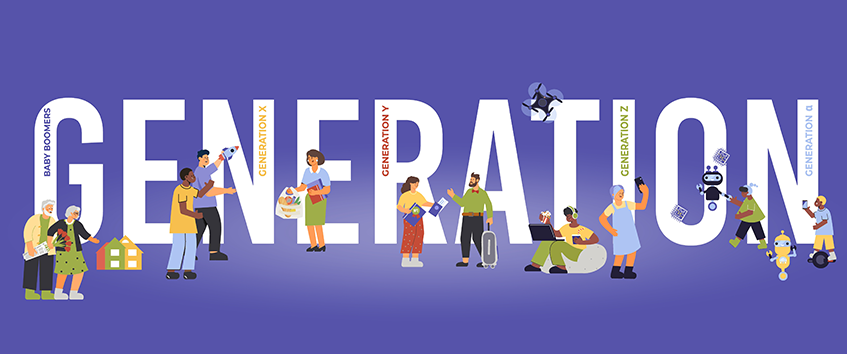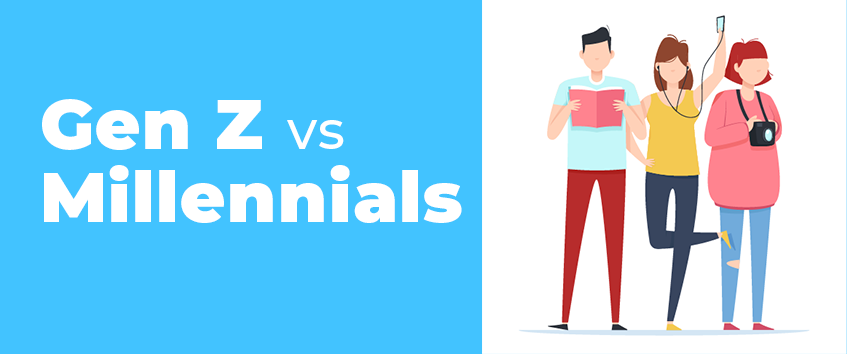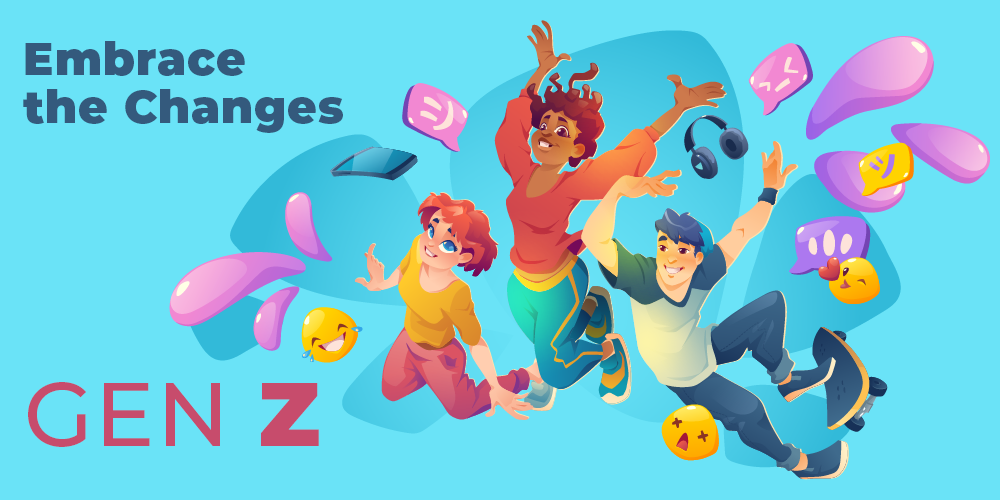Generation Z: Let’s Explore the New Era
March 31, 2023
About Generation Z
Generation Z, also known as the Post-Millennial generation, is the demographic cohort that comes after the Millennials. Although there is some debate about the exact birth years that define this generation, it is generally agreed that they were born between the mid-1990s to the early 2010s, making them currently between 10 to 30 years old.
Generation Z is the first generation who have been exposed to technology and the internet from a very young age, and often described as “digital natives” who are comfortable with using technology for all aspects of their lives.
One of the defining characteristics of Generation Z is its diversity. They are also more accepting of different lifestyles and beliefs than previous generations.
Generation Z is known for being socially and politically conscious. Social justice issues and environmental issues are close to their hearts, and they are not afraid to speak out and act to advance their causes. The members of this generation are also entrepreneurial, and many of them have started their own business.
Their unique characteristics and values have a significant impact on society and the world around us and their attitudes and behaviors are shaping the world in significant ways. In this blog, we’ll explore some of the defining characteristics of Gen Z and the impact they’re having on society.

More about Gen Z
Technology is a way of life
Gen Z is the first generation to grow up entirely in the digital age. They are tech-savvy and comfortable using a range of devices and platforms to communicate, learn, and stay connected with others. They are also more likely to use social media to build communities and share ideas than previous generations. With technology playing such a significant role in their lives, Gen Z positioned as the forefront of innovation and change.
Diversity and inclusivity are non-negotiable
Gen Z is the most diverse generation in history, containing a larger percentage of individuals than previous generations.They also tend to be more accepting of people from different backgrounds and orientations than their predecessors. This has led to a greater emphasis on inclusivity in areas such as employment, education, and social justice.
Activism and social responsibility are core values
Gen Z is passionate about social justice and environmental issues. They are more likely to support companies that align with their values and are vocal about issues they care about. This has led to a rise in activism and social responsibility, with Gen Z leading the charge in a lot of campaigns.
Work-life balance is a priority
Unlike previous generations, Gen Z values work-life balance and manages flexible working arrangements. They prioritize their mental health and well-being and are more likely to seek careers that allow them to better balance their personal and professional lives. This has led to a shift in the way companies approach employment, with many now offering more flexible working arrangements and greater support for mental health.
Personalization is key
Gen Z has grown up in an era of personalized experiences, from targeted ads to customized social media feeds. They expect a high level of personalization in all aspects of their lives, including education, entertainment, and retail. This has led to a greater focus on personalization in these industries, with companies using data and technology to create tailored experiences for their customers.
Let’s go through the 6 famous GENERATIONS
- The Silent Generation- Born 1928-1945
- Baby Boomers- Born 1946-1964
- Generation X-Born 1965-1980
- Millennials- Born 1981-1996
- Generation Z- Born 1997-2010
- Generation Alpha- Born the early 2010-2025
1. The Silent Generation: (78+ years in 2023)
The Silent Generation is thrifty- Members of this generation were born at a time when, because of war rationing and economic uncertainty, some of their parents could barely afford to feed them. This tragic situation led to a new way of thinking about resources, and these children found themselves raised with thriftiness in mind.
The Silent Generation is respectful- Members of this generation typically have a deep respect for authority. They often worked in the same job or company for the majority of their careers.
The Silent Generation is loyal- Members of this generation are not only loyal to their careers but also to their religious beliefs, their relationships, and their families. They value stability and likewise are stable and dependable.
The Silent Generation is determined- This generation experienced many difficult times and challenges. Survival required grit and strength and a strong sense of determination.
2. Baby Boomers: (59-77 years old in 2023)
Strong and focused work ethics- Baby boomers are typically hard-working individuals who often define themselves by their professional accomplishments.
Independent- Many members of this generation grew up with the mentality of being self-reliant and working hard to achieve their goals. They enjoy solving problems on their own and rarely ask for help. Many baby boomers prefer to work on projects alone to completion.
Competitive- Baby boomers experienced a competitive job market because of the rise in the population. Their competitive nature began during their upbringing, when they competed for things in school itself. They do what it takes to achieve their dreams and seek promotions and acknowledgements in the workplace.
Value relationships- Members of this generation may have grown up together in families and shared friendships. They often have strong family values and prioritize their bonds with others.
Experienced- Many baby boomers prefer to work in the same company and seek advancement within it, so they have in-depth knowledge of that company’s operational procedures and goals.
3. Gen X: (43-58 years old in 2023)
Independent- Gen X’ers are independent, resourceful, and individualistic because they have grown up taking care of themselves since before they were of legal age. They respect independence and accountability and strive to solve problems on their own.
Flexible and informal- Gen X’ers are able to adapt to change well and value a relaxed atmosphere. They cherish diversity, enjoy comedy, and live by the motto ‘work hard and play hard’.
Affluent in technology- The generation of Gen X’ers was born during the shift from analogue to digital technology. They are the first generation to have grown up with computers, thus they can quickly pick up on and adjust to new technical developments. They saw the introduction of the Internet and mobile phones. They feel at ease using a variety of technology tools, including computers, tablets, and cellphones.
Ambitious and Eager to learn new skills- They have a strong desire to achieve something, typically by putting in effort and working hard towards a goal.They are self motivated to succeed and may be willing to take on challenges or pursue opportunities that are outside of their comfort zone. Also they are enthusiastic about gaining knowledge or abilities that they do not currently possess. They are excited to expand their abilities and develop new competencies.

4. Millennials: (27 to 42 years old in 2023)
They Values meaningful motivation- They may be characterized as being motivated by creative work, sharing their gifts and making an impact on others and within their communities.
Open and adaptive to change- Most of them recognize that industries are constantly changing and that the methods of working within the modern-day career field must change with them. Being adaptive to a continuously changing atmosphere allows this generation to advance and take on a variety of roles.
Passion for learning- Millennials are open to change and adaptive, but they also seem to possess an extraordinary passion for learning new things. This generation exhibits deep curiosity about the world and displays the desire to further develop skills and knowledge that can help them within their professional lives.
Free-thinking and creative- Millennials grew up during the time of transition from conventional methods to modernized and technologically advanced ways of working. Because of this innovation, they may be more imaginative in their thinking.
5. Gen Z: (11 to 26 years old in 2023)
They’re digital natives
They’re health-conscious
They value their privacy
They’re entrepreneurial
6. Gen Alpha: (under 13 years of age in 2023)
Most certainly, this generation will be the most affluent, educated, and technologically advanced.
Most educated in history- Although the majority of them are still infants, Generation Alpha will be the most educated generation ever when they reach adulthood because of technology and the immediate information available to them.
Tech aptitude- Although Gen Alpha will be the first generation to have technology seamlessly integrated into every part of their lives, their parents may have been the first to be born into a digital environment.
Personalized education- Because Gen Alphas use instant access to knowledge, lectures and other traditional teaching methods are no longer effective.
They are always evolving- Marketers who want to reach the Gen Alphas face a challenge because of their constant change, unlike the previous generations who were predictable.
Major Differences between Gen Z and Millennials
Millennials were born between 1981 and 1996, whereas Generation Z was born between 1997 and 2010. The eldest Millennials are reaching 40 plus in 2023, which indicates they are now entering adulthood while Gen Z is now on the rise. The majority of this generation, which only turned 26 this year, are still in their teens or younger.

While Gen Z and Millennials may share some similarities, there are some key differences between the two generations. Here are a few of the most notable differences:
- Technology: While both generations have grown up with technology, Gen Z is the first generation to have grown up entirely in the digital age. They are more comfortable with technology and tend to use a wider range of platforms and devices than Millennials.
- Diversity: Gen Z is the most diverse generation in history, who are individualistic, self-absorbed and less team oriented than the previous generation. While Millennials are also a diverse group, Gen Z has an even greater emphasis on inclusivity and acceptance of people from different backgrounds and orientations.
- Values: Gen Z tends to prioritize social justice and environmental issues more than Millennials. They are more likely to be vocal about issues they care about and seek out companies aligning with their values.
- Work: Gen Z values work-life balance and flexible working arrangements more than Millennials. They prioritize their mental health and well-being and are more likely to seek careers that allow them to better balance their personal and professional lives.
- Communication: Gen Z tends to prefer visual communication, such as images and videos, over text-based communication. They are also more likely to use social media to build communities and share ideas than Millennials.
Overall, while there may be some similarities between Gen Z and Millennials, the differences between the two generations are significant and reflect the changing attitudes and values of young people today.
In contrast with earlier generations, Generation Z has the following characteristics:
- Less traditional (nuclear) family backgrounds, more have single-parent, and blended families.
- More likely to have friends from various ethnic, religious and racial groups.
- More adverse to risk than Millennials or Baby Boomers.
- Less confident in the current economic system.
- More inclined to become a small business owner.
- Not very religious.
- More likely to spend as much time online than offline.
- More likely to watch entertainment over a phone than a television.
- More likely to shop online than any other generation.
Struggles and Implications of Gen Z
As the newest entrants in the digital world, Gen Z has challenges, stress, worry and lack of engagement. But despite the sobering statistics, there are bright spots for Gen Z and so much to be hopeful about for this youngest generation.Here are a few notable challenges facing by Gen Z:
Economic uncertainty: Gen Z is entering the workforce at a time of economic uncertainty, with high levels of student debt and a highly competitive job market. This can make it challenging for them to secure stable employment and achieve financial independence.
Mental health: Gen Z is facing a mental health crisis, with high rates of anxiety and depression. The pressures of social media, academic performance, and uncertain job prospects can contribute to high levels of stress and burnout.

Inequality and injustice: Gen Z is acutely aware of social and environmental issues, and many are deeply committed to making a difference in the world. However, they are also facing a world that is marked by inequality and injustice, from systemic racism to climate change.
Technology addiction: While technology can be a powerful tool, Gen Z is also at risk of becoming addicted to social media and other digital platforms. This can lead to a range of negative consequences, including reduced attention spans, poor mental health, and social isolation.
Unexpected disasters: This results in financial issues such as debt, unemployment, and low wages. It led to even homelessness. Also, social isolation can lead to mental health issues and a lack of support. It can also make it difficult for younger generations to form meaningful relationships and find support when they need it.
Political polarization: Gen Z is growing up in a world that is increasingly polarized politically, with deep divisions between different groups. This can make it challenging for them to engage with politics and find common ground with others who have different beliefs.
These challenges are not overwhelming but require concerted effort and attention to address. By working together to create a more just and equitable world, Gen Z has the potential to positively impact the world around them.
The prospects for Generation Z
In the upcoming years, the values, attitudes, and experiences of Generation Z will influence the generation’s future, as well as economic, social, and technological developments. The following possible trends and developments could have an impact on how Generation Z develops in the future:-
- Justice: Social justice concerns will continue to be a priority for Generation Z, who are already recognised for their activism and commitment to these causes. We can anticipate seeing more Gen Z people use their voice and influence to promote positive change in society as they get older and more powerful.
- Technology: This will be used more often in the future because it already plays a significant role in Gen Z’s daily existence. We may anticipate that Gen Zers will become even more tech-savvy and creative in their use of technology as it develops and becomes more prevalent.
- Sustainability is stressed: Many members of Generation Z place a high importance on the environment, and expected to hold true in the future. We may anticipate that more members of Generation Z will take steps to lessen their carbon footprint and advance sustainability as the need to address climate change becomes more pressing.
- More adaptable work arrangements: Flexibility and work-life balance are priorities for many Gen Zers, and this trend is expected to persist in the future. We may anticipate more members of Generation Z choosing non-traditional career pathways and seeking out employment opportunities that allow for more flexibility as the gig economy expands and remote work becomes more prevalent.
- Increased inclusivity and diversity: Generation Z is the most diverse generation to date, and it is likely to become even more diverse in the future. We may anticipate seeing more members of Generation Z embrace diversity and advocate for inclusivity in all spheres of society as the world continues to become more interconnected and globalization progresses.
Although it’s impossible to know for sure what the future will bring, we can anticipate that members of Generation Z will keep making significant contributions to society.

In conclusion, Gen Z is a diverse and dynamic generation that is shaping the world around us in significant ways. From their use of technology to their commitment to social justice and environmental issues, they are leading the way in creating a more inclusive and sustainable future. As the youngest generation currently in the workforce, they are sure to continue having a profound impact on society for years to come.
